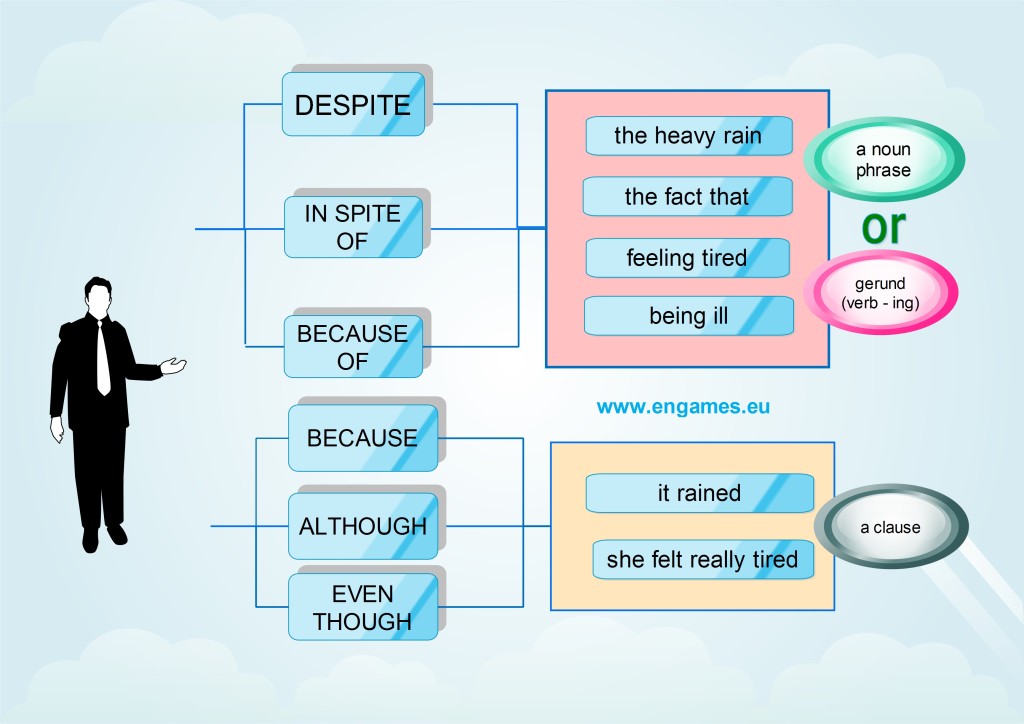An adverb clause (a dependent clause) is a group of words that plays the role of an adverb. There are different kinds of adverb clauses: time, place, condition, manner, contrast, purpose, comparison or degree, cause and result.
RELATED: Don’t miss our Complete guide to adverb clauses with definitions, types, and examples.
Clauses of contrast
Clauses of contrast (or concession) are used to show the difference between two statements. We can use ‘although’, ‘though’, ‘even though’, ‘in spite of’ and ‘despite’.
Although
’Although’ can be used at the beginning or in the middle of a sentence. It is followed by a subject and a verb:
- Although it rained, they enjoyed their walk.
- They enjoyed their walk, although it rained.
Though
We use ‘though’ in a similar way to ‘although’, but it is more informal. In spoken English, ‘though’ is more common than ‘although’:
- Though it was expensive, I enjoyed the meal.
- I enjoyed the meal, though it was expensive.
Even though
‘Even though’ is a little stronger than ‘though’ and ‘although’. It can also be used at the beginning or in the middle of a sentence. Again, it is followed by a subject and a verb:
- Even though I was full, I couldn’t stop eating.
- I couldn’t stop eating, even though I was full.
In spite of
We use ‘in spite of’ at the beginning or in the middle of a sentence. It is followed by a noun, a pronoun or a gerund (-ing):
- In spite of the pain, Harry finished the race.
- Harry finished the race, in spite of the pain.
Despite
We use ‘despite’ at the beginning or in the middle of a sentence, too. Again, it is followed by a noun, a pronoun or a gerund (-ing):
- Despite the snow, I drove to my grandma’s house.
- I drove to my grandma’s house, despite the snow.
| Note: Do not use ‘of’ with ‘despite’. For example: – I drove to my grandma’s house, despite the snow. NOT: You must use ‘of’ with ‘in spite of’. For example: – I drove to my grandma’s house, in spite of the snow. NOT: |
This chart shows the usage of clauses of contrast in summary:



Watch this video from EngVid to learn how to express opposing ideas in English:
Clauses of purpose
Clauses of purpose are used to show why something is happening. We can use ‘to’, ‘for’, ‘in order to’, ‘so as to’ and ‘so that’.
To
We often use ’to’ to show why something is happening. We use the infinitive form of the verb:
- My mother went out to buy some milk.
- ’m going to Spain to see my friend.
- I’m going outside to find some flowers.
For
We use ‘for’ to show the exact purpose of something. It is followed by a noun or a gerund (-ing):
- We went to the supermarket for bread.
- The mop is for cleaning the floor.
- She went out for a meal.
In order to
‘In order to’ is more formal than ‘to’. Again, we use the infinitive form of the verb:
- I did some research in order to find the best music player.
- A meeting was arranged in order to discuss the team’s progress.
- Harry studied all night in order to pass his English exam.
So as to
‘So as to’ is also more formal than ‘to’. Again, we use the infinitive form of the verb:
- I bought a smaller car so as to save money.
- Elliot moved to a new house so as to be closer to his parents.
- She left early so as to be at home with her family.
| Note: When we want to say something negative using ‘in order to’ or ‘so as to’, we can put ‘not’ before the ‘to’. For example: – I woke up early in order not to miss the bus. – I woke up early so as not to miss the bus. |
So that
‘So that’ is paired with a subject and a modal verb like ‘could’, ‘would’, ‘can’ or ‘will’:
- I gave her my phone number so that she could call me.
- I’m going out so that I can buy fruit.
- I did some exercise so that I would feel better.
This video explains how to use adverb clauses of purpose:
Read more on this topic:
Adverb Clauses of Cause, Result and Comparison